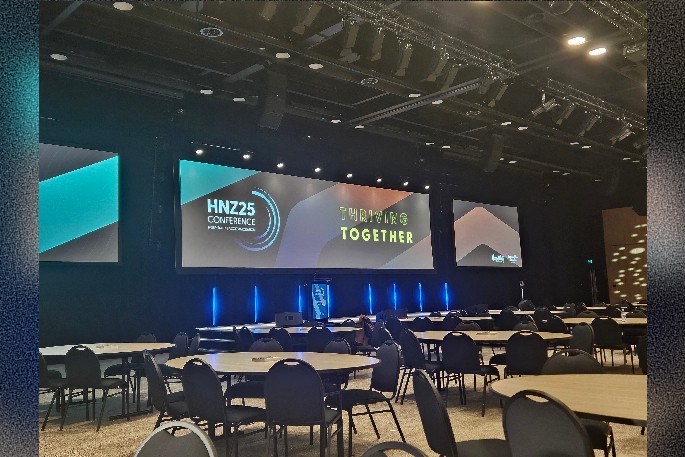This Content Is Only For Subscribers
Tuesday June 10 saw hundreds of delegates streaming through the doors of Tākina for day one of Hospitality New Zealand’s 2025 Conference — a day that promised more than just networking and great coffee (and refills!)
Tākina Wellington Convention and Exhibition Centrewas buzzing early as attendees picked up their passes and made their way through its trade show sponsored by Coca-Cola Europacific Partners.
The morning opened with a mihi whakatau led by Nate Rowe before Hospitality NZ (HNZ) chief executive Steve Armitage took the mic to officially welcome members and partners and spoke of the progress HNZ has been making with a new structure, new team and website, but says there are still areas for improvement that include, data “drive smarter growth” he says. Workforce, “Make sure the industry can retain growth” he says and Compliance, “Reducing compliance burden” he says.
There was also economic insights from economist, Shamubeel Eaqub setting a realistic – if not cautious – tone for the sector’s year ahead of a positive outlook, diverse customers and positive trends, but ongoing demand and supply issues, along with sharp pricing in the industry. The takeaway though?
Hospitality is not dying.
Hon. Louise Upston, minister for Tourism & Hospitality, addressed the government’s lens on the industry’s priorities which she says is “to increase the number of visitors to NZ, back to 2019 numbers, and “double the value of export to tourism” as well as “increase the number of Kiwis working in the tourism and hospitality industries”
Tourism New Zealand’s Bjoern Spreitzer, also shared data and projections from the continued ‘growth’ phase in tourism, which the recent Minecraft movie, is helping some of that growth in visitors coming to New Zealand. New trends emerging is ‘off-peak and off the beaten path’ (interest in lower demand activities or off season travel combined with less populated tourist areas and regions)
There was panel discussions and streams exploring everything from alcohol regulation (with some very interesting and raised questions) and police partnerships to artificial intelligence, digital marketing, and labour mobility. Breakout sessions were curated with operators in mind, allowing delegates to choose their own deep-dive on issues as diverse as sustainability, digital identity, cultural accessibility, and Class 4 gaming.
Stay tuned as day two follows.



